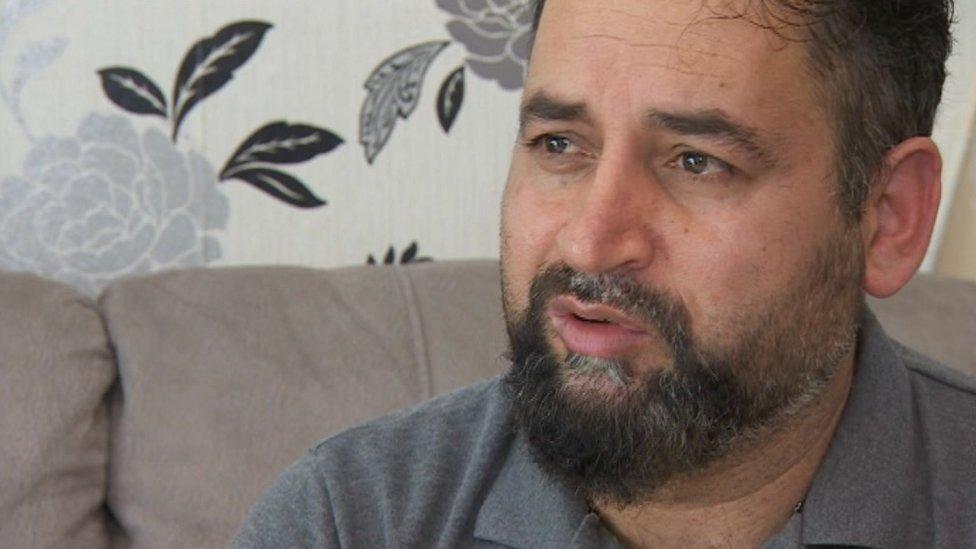Afghanistan: Kabul evacuation gathering pace, says ambassador
- Published
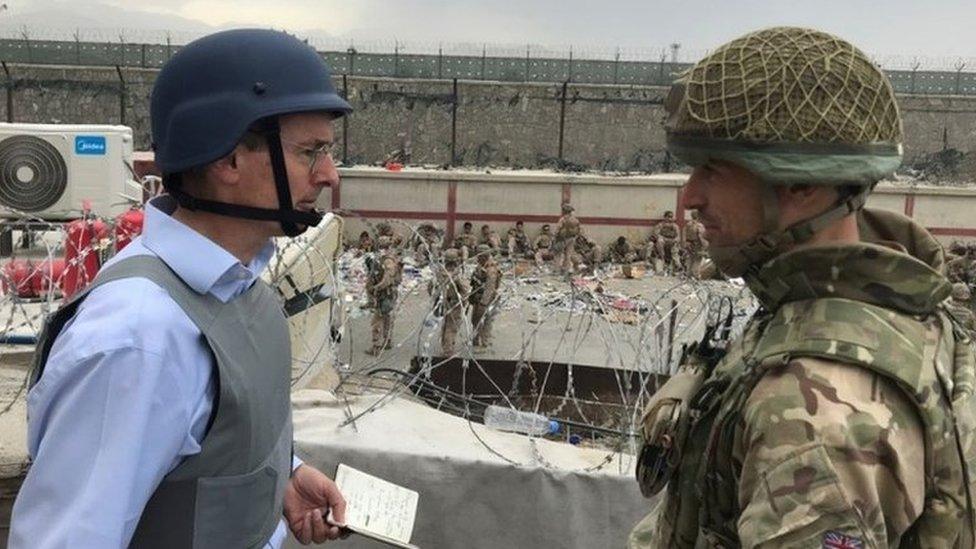
British ambassador to Afghanistan Laurie Bristow (left) speaking to a member of the UK armed forces at Kabul airport
Efforts to evacuate Britons and eligible Afghans from Kabul are gathering pace, the British ambassador says, with nearly 6,000 flown out on UK flights since 13 August.
Sir Laurie Bristow, who remains in the Afghan capital, said 1,000 people had departed in a 14-hour period alone.
It comes after the government said seven Afghan civilians died in chaotic crowds outside the airport on Saturday.
The US is under pressure to extend evacuations beyond the end of August.
The Ministry of Defence said the total figure stands at 5,725 people - 3,100 of whom are Afghan nationals and their families.
Sir Laurie, speaking from the evacuation handling centre in Kabul, praised the efforts of all those helping - including soldiers, diplomats and Border Force staff - but added "there is still a huge amount of work to do". He said he was "so proud of what our people are doing".
Earlier, armed forces minister James Heappey said the Taliban were now marshalling queues at the airport, speeding up the process.
"Today the queue is flowing better," Mr Heappey said on Sunday, adding that the Taliban were overseeing separate UK and US evacuation queues, which was "making a big difference".
He urged more people to come forward if they had been told to do so.
Allow X content?
This article contains content provided by X. We ask for your permission before anything is loaded, as they may be using cookies and other technologies. You may want to read X’s cookie policy, external and privacy policy, external before accepting. To view this content choose ‘accept and continue’.
Until now a lot of people had been put off going to Baron Hotel in Kabul, where many British nationals have been told to travel for processing, because of reports of violence and chaotic scenes, he said.
Leaders of the G7, including US President Biden, are meeting virtually this week to discuss the situation.
UK Prime Minister Boris Johnson said it was "vital that the international community works together to ensure safe evacuations, prevent a humanitarian crisis and support the Afghan people to secure the gains of the last 20 years".
The UK, which holds the leadership of the group at the moment, had called for Tuesday's meeting.
Mr Johnson spoke to ruling emir of Qatar Sheikh Tamim bin Hamad al-Thani on Sunday, Downing Street said. The pair agreed it was vital that Afghan people continue to be supported, and that the international community fully funds the aid response, it said.
Meanwhile, Labour leader Sir Keir Starmer has urged Mr Johnson for more details on what he has done to extend the evacuation period. In a letter to the prime minister, he said there were "too many unanswered questions" about the mission, adding: "Proper planning for the coming days will ensure that no-one to whom we owe so much will be left behind."
The US has a planned deadline of 31 August for withdrawal from Afghanistan - but President Biden has said troops may stay past this date to help with evacuations.
Armed forces minister Mr Heappey reiterated previous comments from ministers that the UK could not say with confidence it would get all British nationals out, but he said more capacity was becoming available with each day and other nations were joining the UK effort.
Writing in the Mail on Sunday, Defence Secretary Ben Wallace said the US would have his complete support if it chose to push back the deadline for leaving but there was "no time to lose" to get people out of the country.
Mr Heappey said if the US did stay longer that would give the UK the opportunity to continue flying people out.
But he also gave some reassurance that even if the deadline was not extended, people would still be able to access the UK resettlement programme through other routes, such as handling centres in refugee camps or embassies.
General Lord Richards, who was Chief of the Defence Staff and commanded international forces in Afghanistan in 2006, told the BBC there was "no doubt" lives would be saved if troops could stay beyond 31 August.
A UN multilateral humanitarian intervention operation needed to be implemented quickly, he told Radio 4's Broadcasting House.
Former UK Prime Minister Tony Blair, who sent British troops into Afghanistan 20 years ago, said the UK had a "moral obligation" to stay in the country until "all those who need to be are evacuated".
The exit of allied troops would have every Jihadist group around the world cheering, he wrote on his website, external, and called the US withdrawal "tragic, dangerous, and unnecessary".
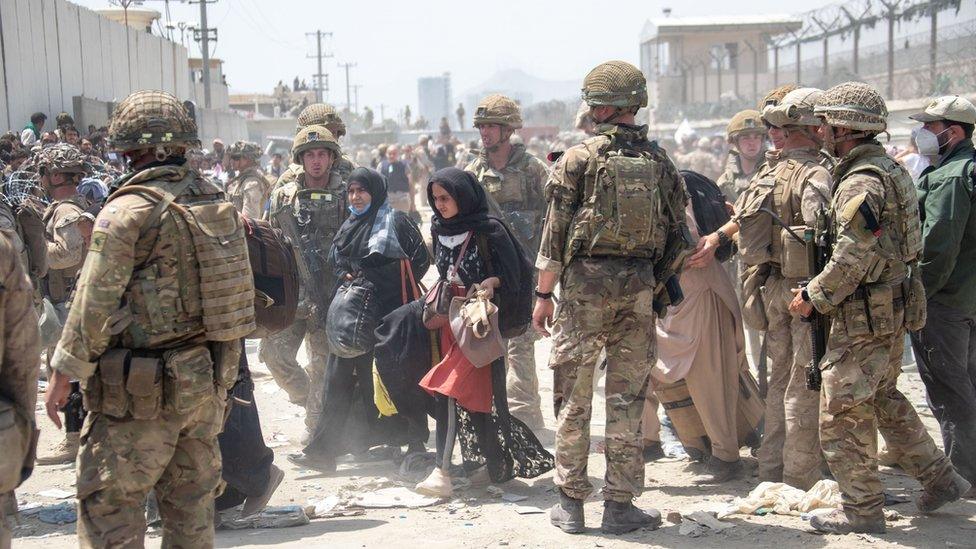
Calls are being made for troops to stay in Afghanistan beyond August to help with the evacuation
Mr Heappey was asked for his reaction to reports that the prime minister gave Foreign Secretary Dominic Raab permission, external to stay on his summer holiday as Afghanistan collapsed into chaos.
He responded saying everyone who should have been at the emergency Cobra meetings was there and it was "simply not the case there was any delay in enacting this longstanding plan because of where in the world people were at the time".
Mr Heappey was also asked about the defence secretary's suggestion in his article that the UK could still retain a presence in Afghanistan after the military had gone.
"It's something we would hope for because that takes away from the urgency of this week but the Taliban have a vote in that," he said.
"That might be a presence that emerges in six months, a year, two years' time," he said, adding that it would depend on how the international community wanted to recognise the Taliban and whether the Taliban were willing to have an international presence in the country.
"I certainly don't think we should rush to recognise the Taliban," he said.

FIVE GIRL BANDS THAT MADE A STATEMENT: Moments where real life and music merged
DO ARGUMENTS SOLVE ANYTHING?: Hayley Pearce considers the best way to handle a fight

Related topics
- Published22 August 2021
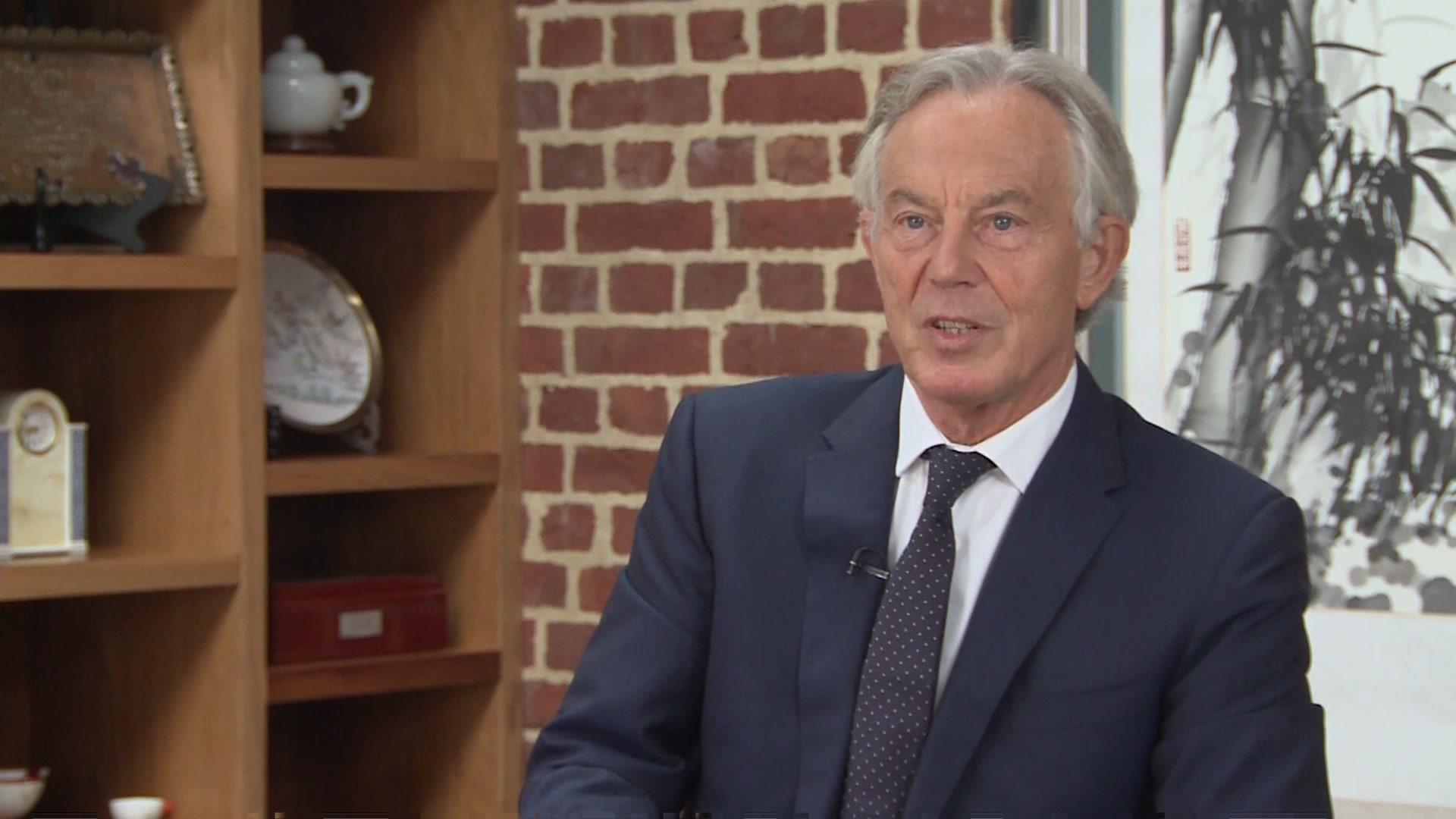
- Published22 August 2021
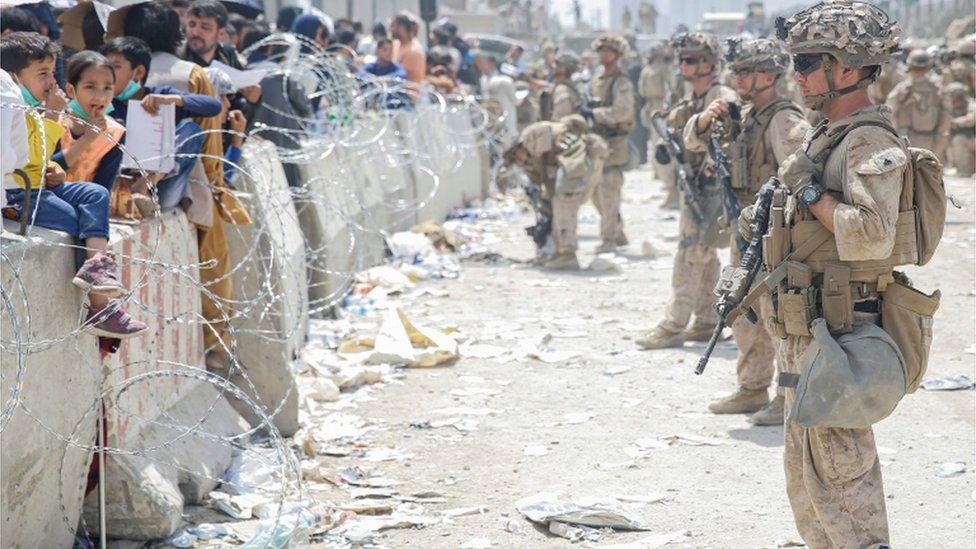
- Published22 August 2021
